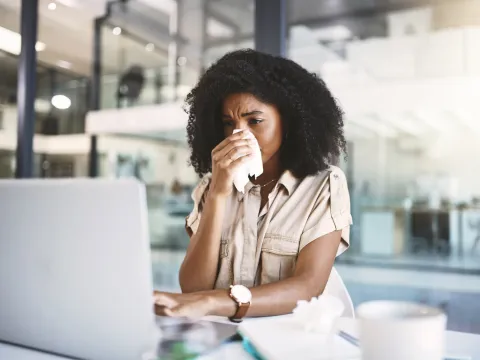- AdventHealth

Turn on the news or scroll through social media and you’ll likely see endless coverage of coronavirus. Much of the information is focused on how to prevent coronavirus (COVID-19) from spreading and how to protect yourself and your family.
But what do you do if you have symptoms of coronavirus? Do you know what steps to take and what to expect in terms of recovery? Here are the general guidelines around caring for yourself and keeping others safe.
Know the Symptoms of Coronavirus
If you’re exposed to coronavirus, you may notice symptoms anywhere from two to 14 days after the exposure. The most common symptoms of coronavirus include fever, cough and shortness of breath. Symptoms have ranged in severity from very mild to very severe.
If you have symptoms, call your physician and they will tell you the next steps you need to take to receive a diagnosis and get care. Another option is to use the CDC’s Coronavirus Self-Checker, a tool to help you decide what type of medical care you need.
What to Do if You’re Sick
If you do have symptoms or are diagnosed with coronavirus, the CDC has specific recommendations on what to do during your recovery:
- Get plenty of rest and drink fluids to stay hydrated
- Stay home except to get medical care (If you do need to go out, don’t use any type of public transportation, including ride-sharing or taxis)
- Stay away from others in your household as much as possible and disinfect commonly used surfaces often
- Watch your symptoms carefully and if you suddenly feel worse, call your doctor right away
- If you need to see your doctor, call the office before your visit to let them know you might have COVID-19 and wear a mask before entering the building
Read our previous blog for more specific details about what to do if you’re at home with symptoms of coronavirus.
When to Call Your Doctor or Schedule a Telehealth Visit
In most cases, people with coronavirus have mild to moderate symptoms and can recover safely at home without going to the hospital or seeking medical care. But if you have any questions about your symptoms or if you’re not sure if you need medical help, call your health care provider.
You can also schedule a video visit with a provider using the AdventHealth app. During a telehealth visit, the physician will ask questions to assess your condition and determine next steps. He or she can also help with other medical needs.
When to Get Emergency Help
If you develop any severe symptoms of coronavirus, it’s important to get emergency care right away. These symptoms include:
- Bluish-colored lips or face
- Confusion or an inability to wake up
- Pain or pressure in your chest that doesn’t go away
- Trouble breathing
If you have an emergency, call 911 and let them know you might have COVID-19.
How to Know When You’ve Recovered From COVID-19
If you’ve recovered at home during your illness, you should stay isolated until you are no longer contagious to avoid spreading the virus. To be sure, you should not go out in public until all three of the following statements are true:
- All your symptoms, such as cough or shortness of breath, have improved
- It’s been at least seven days since your first symptom
- You have been fever-free for at least 72 hours without taking medicine to reduce your fever
If you have any questions about whether you are recovered enough to leave your home, ask your doctor or local health department.
Recovery If You’ve Been Hospitalized for Coronavirus
If you were hospitalized for coronavirus, it may take longer for you to recover and you may be contagious for a longer period of time. This may also be the case if you have a medical condition, such as a bone marrow or solid organ transplant, poorly controlled HIV, or an immunodeficiency disease, or if you take medication that affects your immune system, such as immunosuppressive drugs. Talk with your care team about recovery and isolation guidelines before you leave the hospital.
Get Up-to-Date Coronavirus Information
The news about COVID-19 is changing every day. Stay up-to-date by visiting the CDC online. You can also turn to the AdventHealth Coronavirus Resource Hub for information to help keep you safe during the coronavirus pandemic.



